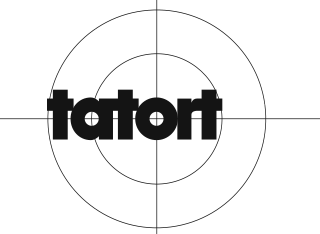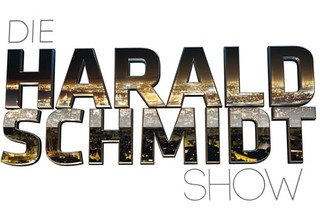
Harald Franz Schmidt is a German actor, comedian, television presenter and writer best known as the host of two popular German late-night shows.

ARD is a joint organisation of Germany's regional public-service broadcasters. It was founded in 1950 in West Germany to represent the common interests of the new, decentralised, post-war broadcasting services – in particular the introduction of a joint television network.
Tagesschau is a German national and international television news service produced by the editorial staff of ARD-aktuell on behalf of the German public-service television network ARD.

TV total is a German late-night television comedy talk show which originally aired from 8 March 1999 to 16 December 2015 on ProSieben, hosted, created and produced by entertainer Stefan Raab. Following a six-year hiatus, it was revived on 10 November 2021 with Sebastian Pufpaff as host.

Tatort is a German language police procedural television series that has been running continuously since 1970 with some 30 feature-length episodes per year, which makes it the longest-running German TV drama. Developed by the German public-service broadcasting organisation ARD for their channel Das Erste, it is unique in its approach, in that it is jointly produced by all of the organisation's regional members as well as its partnering Austrian and Swiss national public-service broadcasters, whereby every regional station contributes a number of episodes to a common pool.

Bayerischer Rundfunk is a public-service radio and television broadcaster, based in Munich, capital city of the Free State of Bavaria in Germany. BR is a member organization of the ARD consortium of public broadcasters in Germany.

Verbotene Liebe was a German television soap opera created by Reg Watson for Das Erste. The show was set primarily in the German city of Düsseldorf although, at times, the city of Cologne and the Spanish island of Mallorca figured prominently in the show's story lines. First broadcast on 2 January 1995, Verbotene Liebe was originally broadcast in 24-minute episodes, five times a week. It expanded to 45-minute episodes on 21 June 2011 and trimmed back to 40-minute episodes on 23 January 2012 to accommodate an adjusted time-slot. In 2006, Pay-TV network Passion began broadcasting episodes of the show from the beginning.

heute is a television news program on the German channel ZDF. The main program is broadcast at 19:00, and includes news, with an emphasis on political news from Germany, Europe and the world, plus 'mixed' news from cultural life or entertainment, and the sports news with an extra presenter. The weather forecast comes up about 19:22 after a break with commercials. For many years, the opening sequence of each broadcast featured an analogue clock, a signature element of the program. On July 19, 2021; the opening sequence switched to a digital clock along with updated graphics and music, along with a new anchor desk and set.

Schmidt & Pocher was a German late-night talk show hosted on Das Erste by comedians Harald Schmidt and Oliver Pocher in the Thursday 10:45 pm time slot from 25 October 2007 to 16 April 2009. It was the successor of Harald Schmidt on the same network.
Germany has a long tradition of television comedy stretching as far back as the 1950s, and with its origins in cabaret and radio.

The Graham Norton Show is a British comedy chat show presented by Graham Norton. It was initially broadcast on BBC Two, from 22 February 2007, before moving to BBC One in October 2009. It currently airs on Friday evenings.
Bayerischer Fernsehpreis is an award presented by the government of Bavaria, Germany since 1989. The prize symbol is the "Blue Panther", a figure from the Nymphenburg Porcelain Manufactory. The prize money is €10,000.

Oliver Pocher is a German comedian, entertainer, television personality and host.
Die Oliver Pocher Show was a late-night show with Oliver Pocher shown by Sat.1 in Germany on Fridays. The show is a mix of late-night comedy and personality. Each broadcast begins with stand-up comedy. There are generally two celebrity guests. During the first season, Pocher's father Gerard frequently appeared on the show as a sidekick.

Die Harald Schmidt Show was a German late-night talk show hosted on Sky Deutschland by comedian Harald Schmidt. The show first aired from 5 December 1995 to 23 December 2003 on Sat.1. Schmidt then moved his show to Das Erste as Harald Schmidt and Schmidt & Pocher, but he returned to Sat.1 on 13 September 2011. After cancellation on Sat.1, the show continued on Sky Deutschland in September 2012. Schmidt retired from television in 2014.
Für alle Fälle Stefanie is a German medical drama television series created by Werner Krämer that aired on Sat.1 from 15 May 1995 to 29 August 2005. It was produced by Novafilm Fernsehproduktion. Für alle Fälle Stefanie follows the professional and personal life of nurse Stefanie Engel, then Stephanie Wilde and for a short time Fanny 'Stephanie' Stephan. The show was a giant success for the network and had around seven, in later years, five million viewers on a weekly basis. It won the Goldene Kamera award in 1997 and the Bavarian TV Award in 1996.

NightWash is a German television comedy show in which young artists and new stand-up comedy talents have the opportunity to perform in front of an audience with their program, typically lasting for 7–10 minutes. The series was created by, and is produced and presented by Klaus-Jürgen Deuser. The series made its TV debut on 14 October 2001 on WDR TV; it had existed as a live show since 2000. From 2007 until October 2009, it was broadcast on Comedy Central, and since November 2009 it has been aired on digital channel Einsfestival. The original series was set in a coin-operated laundrette in the Belgian quarter of Cologne.

Promi Big Brother is a German television reality show based on the Dutch show Big Brother, created by producer John de Mol in 1997, which is airing from 2013. The show followed a number of celebrity contestants, known as Promis, who were isolated from the outside world for an extended period of time in a custom-built Set. In Season 1-7, after the second week, every day, one of the housemates was evicted by a public vote, with the last housemate, named the winner. For the first time, season 8 of Promi Big Brother aired for three weeks.
Talk im Turm was a weekly talk show that dealt with political and social topics, primarily with a focus on Germany. Mostly German politicians or public figures were invited. The talk was broadcast on Sundays at 22:00 in the length of one hour. It was produced for Sat.1 first in Bonn and later in Berlin and ran for almost a decade from 1990 to 1999.

hart aber fair is a German weekly political talk show. In the 75-minute broadcast on Monday evening on Das Erste, presenter Frank Plasberg discusses a controversial topic with his guests. Spectators receive additional information through short feature films and can participate directly. Before switching to ARD's main programme Das Erste, the programme was broadcast at WDR Fernsehen for seven years.














